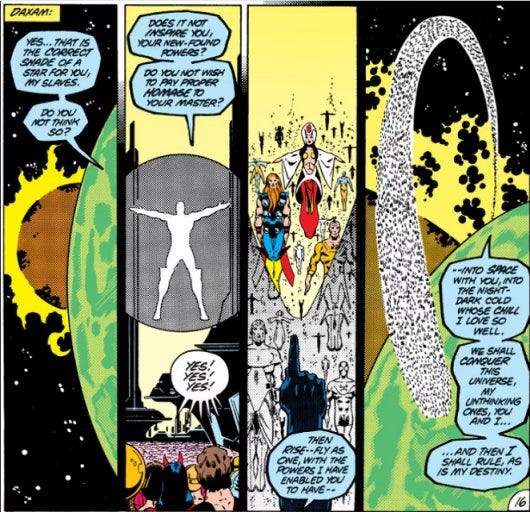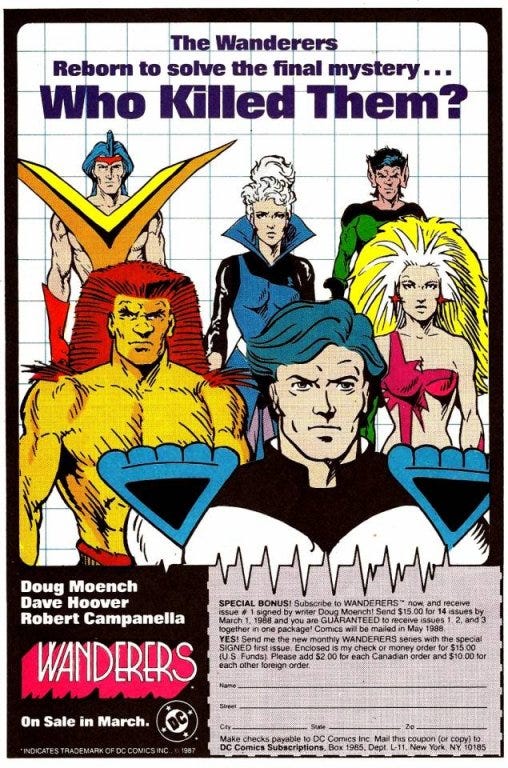This is 20th Century Refugee, the recently more frequently newsletter of Glen Cadigan. You'll find it in your inbox when I have something on the stands or something to announce, and since my interview with Keith Giffen was reprinted last week, here we are! But where was 20th Century Refugee last week when it was hot off the press? We'll get to that in a minute. First...
Gloom n' Doom
Winter is upon us, and for many, that means the winter blues. Plus, Diamond filed for Chapter 11 bankruptcy protection last week, and there's all of the uncertainty that goes along with that. There are a lot of reasons to break out the harmonica and start singin' the blues if your distributor just hit an iceberg, but let me tell you something you don't know about me:
I like winter. I think it brings focus to my work, and it's (by far) my most productive season. That's because cold weather means staying indoors, which is where my work is actually accomplished. Also, the extra hours of darkness add more hours to my day since I'm a nocturnal writer, so I get more work done. What I do now sustains my so-called career for most of the year, kind of like how stores are propped up by Christmas, or certain Florida towns by Spring Break. So even if the world is on fire outside my window -- and it presently isn't -- I have to keep my eyes on the road.
But that doesn't mean that life can't throw me a few curveballs. Professionally, I mentioned Diamond above. Personally, we had a big windstorm here recently, and in addition to some shingles blowing off my roof (which were only installed a year-and-a-half ago), a tree blew over and hit my Fortress of Solitude, a.k.a. my cabin in the woods.
This is my sanctuary, my place where I go to be Robinson Crusoe and get away from it all. And that wasn't the only tree that I found standing at an acute angle when I got there.
So myself and my chainsaw were very busy for a few days, putting trees to rest. And while I was there, I wasn't here, working on this. So that's what happened to my newsletter last week. (Not that it's weekly, mind you, but I missed the pub date of Back Issue! # 157, which actually started appearing in stores before then. It's complicated, even when your distributor isn't struggling to stay alive.)
Now, I could look at all of that as wasted time, but it really wasn't. And there wasn't anything I could do about it, so it didn't pay to bemoan my fate. Also, I was reminded of something while I was at the dentist just after New Year's. I saw the calendar reading 2025 on the wall, and like the start of every year, I suffered a bit of sticker shock. Then I put it in perspective; that means five years ago was 2020, and it definitely felt like the world was on fire back then. There were daily death counts in the news, and people tuned in every day to see how many more people had died, as if they were checking sports scores. Every day was a disaster by normal standards, and normal wasn't normal anymore.
That was five years ago. In between, there was an entirely different president, that's how long ago it was. And yet, it also feels like only five minutes have passed. Back then, time seemed to have stopped, and I repeat, that was five years ago. So this too, shall pass, whatever it is that has you concerned. Maybe a bunch of small publishers will be sucked down with Diamond, or -- like my cabin -- the damage will be light and easily repaired. At this point, nobody knows. It always feels like the end of the world when we don't know what will happen next, and it never is. It's nice when things are predictable and we feel like we're in control, but a lot of that is an illusion, or lies we tell ourselves to make ourselves feel better. Whatever gets you through the day, right? Or night, as the case may be.
More Self-Promotion
Outside the comic book industry, as advance copies of The Strawman make their way to advance readers, news trickles back, like messages received in response to a bottle found on a foreign shore. Author of the comic book flavored novels Secret Identity and Alter Ego, Alex Segura, made the following post on Instagram (where I maintain a borderline covert presence):
For everyone else, there's a free preview over here for you to read.
Alex is also a comic book industry veteran, with years logged at Archie, DC, and Oni. He's currently writing The Question: All Along the Watchtower for DC, a bunch of Star Wars stuff at Marvel, and Dick Tracy for Mad Cave, along with his creator-owned projects. Thanks, Alex, for the plug! (And if there are any other award-winning authors out there interested in a copy, drop me a line!)
Keith Giffen! Keith Giffen! Keith Giffen!
Like I said earlier, Back Issue! #157 should now be in the hands of everyone who ordered it. Its release date was January 15th, but copies appeared in select stores before then, some as early as the dying days of 2024!
It has my 2003 interview with Keith in it, presented (more or less) as it happened. All you had to do when you interviewed him was wind him up and let him go, something Harry Broertjes discovered years earlier when he interviewed the Legion writer-artist back in 1988, shortly after his return to the title. Back then, Keith was drawing Paul Levitz's last year on the series before he later took it over himself, with Tom & Mary Bierbaum as his co-pilots. It really is a moment in time preserved in amber, and unless you're new in these here parts, you've already read Part 1 & Part 2 in previous installments of this newsletter. (And if you are new, howdy! Go on back and get yourself caught up!)
I've said it before, and I'll say it again: Harry's 1988 interview is the perfect supplement to mine. It covers all the ground that I didn't get to cover, so just like peanut butter and chocolate, the two go together for a yummy treat! Also like a yummy treat, you can't read just one, so take my advice and read them both. One is free, and the other will cost you money. You're here already, so that takes care of the free one. As for the other, there's really no excuse. If this is the sort of thing you like, what are you waiting for? Assuming you haven't read it already. (If you haven't, we can keep it between ourselves -- for now. But you've gotta know, a secret like that will leak out eventually. So do yourself a favor and order a copy at the TwoMorrows' website today!)
HB: Is there anything you do that gets Paul pissed at you? Is there anything you do that makes him slap his forehead and say, “That darned Keith, what’s he doing that for?”
KG: Interesting. He doesn’t come in and say, “Jesus, what do you do this for?” He comes in and sort of shakes his head and with this horrible look on his face and lets me know I’ve gone a bit too far. I blew Mon-El’s left hand off [in #50] and he said, “Now that’s a bit too much.” In a way, I did push it too far, but he’s never really come back to me and been really pissed off about anything that I’d done that he wasn’t expecting. There’s never been any time when he’s come to me and said, “This is patently ridiculous — redo the whole thing,” “This is garbage,” or, “I don’t know where your head was at, but this sucks.” He enjoys the back and forth. He sort of gets a kick out of the fact that somebody’s thrown the ball downhill. He’ll throw it right back twice as hard.
For every time that I’ve done something like bring Invisible Kid back, he’s said, “OK, fine, here’s the panel description: The entire population of Daxam rises off of the planet.” We have a real good give and take.
HB: Is there anything that he does that irritates you?
KG: No, not really. He knows the book so well that lots of times I’ve just got to take his word for a lot of stuff. But it’s not that I get rankled — it’s just that sometimes I’ll be amused by something like “the entire population of Daxam,” which was the actual panel description. And I’m amused by it to this day. Sometimes he’ll put something down there, I’ll look at it and I’ll go, “Ohhhhkaaayyy...” but it’s more in amusement, and I’ll sort of dance around it rather than go in and say, “What are you, an idiot? `The whole population of Daxam’! What do you think I am? Why even bother to do that? There’s other ways of handling it!”
We get along pretty good.

HB: That’s been pretty clear all along. It appears you’ve got a looser leash than most of the artists he’s worked with.
KG: No, really, he’ll give that loose leash to...
HB: Let me put it this way: you’re the one who, probably more than others, who has stretched that loose leash.
KG: Yes. A lot of artists in the business will come onto a job and draw the plot. And sometimes they won’t even draw the plot. They’ll drop stuff out that they don’t feel like drawing, or combine scenes. I’ve always tried to make it a point when I pick up a plot never to take anything out, but, if possible, to add. There’s no way on Earth a writer is going to get mad at you in that way. There’s no way on Earth you’re going to start getting hard feelings unless the guy is a real megalomaniac. Which Paul isn’t. At least, not to me. He wasn’t on The Legion when I first encountered him, and that’s how I base my opinions. Maybe Paul sets cats on fire. I’ve never seen him do it. He didn’t do it to my cat. You make your judgment on the person who’s facing you. So, no problem.
HB: What do you think of the new Wanderers?
KG: God, I’m sorry, Doug [Moench], but they suck. I went in to Karen and I said, “You keep them two star systems away from the Legion.” I don’t want them in my back yard. I’ve read the first two issues. I don’t know how many others have come out, but I know I won’t be reading any more. I don’t want to go any further than that except to say that I won’t read it, and I want to pretend it’s not there.
HB: So if it’s up to you, we won’t have any Wanderers showing up in The Legion?
KG: I don’t know. But if they do show up in The Legion, I’ll do my best by it. I’d really prefer they didn’t at this point, but if it happens and there’s a plot and the Wanderers are there, I’ve got no authority to go in and say no.

HB: Well, conceivably you could go to Paul and say, “We don’t really want to do this, do we?”
KG: There’re usually other reasons for doing it. If the Wanderers were to appear in The Legion, we would work it out between Doug and Paul, or it would be something that Paul feels is important to the story. So I can’t go in and say, “Jeez, you know this story that revolves around the Wanderers — do we really need the Wanderers?” [And Paul would say,] “Well, yes, it’s kind of a Wanderers story.” I’d rather not draw them. I’d be very vocal about it. But if I have to draw them, I will; if I have to deal with them, I will. It’s like the Heroes of Lallor. I hate them — I’ve always hated them — but I’ve dealt with them, and if I have to deal with them again, I’ll deal with them again. Maybe if I were plotting the book as well as penciling it, I’d have more to say about it. At this point, I’m penciling the book and just harassing Paul.
HB: Are you going to keep penciling the book, or are you still planning to go to breakdowns?
KG: My breakdowns [on #53] — you probably wouldn’t be able to tell the difference in my breakdowns from the pencils. It wasn’t put in the credits. But it’s faster. The book is kind of late, so it will up my speed a bit, and there are other projects up at DC that I committed to that I want to do, and rather than drop off of The Legion for four months while I do these other things and then come back, I’ll go to breakdowns, which is just as effective. DeCarlo will handle them just the same way, there’s the same amount of information relayed, and I’ll be able to stay on The Legion as well as do these other projects. [As it turned out, Keith returned to full pencils on The Legion as of #54.]
HB: Let’s talk about these other projects. What are they?
KG: Of course, the ongoing Justice League concern. And there’s the companywide crossover which, this year, is called Invasion [which I’m plotting], wherein we get to see — we’ve seen Earth in the Twentieth Century and in the Thirtieth Century, but what were the Khunds doing in the Twentieth Century, or the Dominators? I’m trying to apply some of the Legion’s sci-fi to the universe in the Twentieth Century — sort of projecting backward to what they’d be like.
HB: Without giving too much away, what’s the basic story there?
KG: Have you ever read the book [by Tom Clancy] called Red Storm Rising? Invasion is a combination of Red Storm Rising and the Mars Attacks cards, with a little bit of genetic manipulation thrown in there. It’s basically a good old-fashioned “Look out, Earth, here come the aliens to take over!” story. We also do a little bit of delving into the nature of super-powers and why, if Barry Allen got splashed by chemicals and Joe Shmoe got splashed by chemicals, why would Joe Shmoe simply be electrocuted by the lightning or burned by the acids whereas Allen got super-speed? What’s the difference between these two people?
Other than that, it’s three 80-page issues. I’m talking 80 pages of story content, not 74 pages of story and the rest are ads. I’m plotting and breaking it down. Andy Helfer is editing it. Todd McFarlane is penciling it. We’ve broken each one down into four separate chapters. Craig Russell is inking the first chapter, Al Gordon the second chapter, tentatively Dick Giordano for the third, and Joe Rubinstein for the fourth. And Bill Mantlo will be supplying the dialogue.

HB: Bill Mantlo? That’s his first work for DC, isn’t it?
KG: Exactly. He’s been doing night court for a while. He’s an attorney now. You ever see the show Night Court? He’s sort of doing Markie Post’s role as the defense lawyer. He’s not half as attractive as Markie, but he’s living that show, basically. And he’s been out of the field for quite a while, and he decided he’d like to get back in again. And Invasion is sort of a hideous baptism — if he can write Invasion, there’s no DC book he can’t write. And he’s getting more freedom than he’s ever had before. He doesn’t have somebody telling him to pull the guts out of his stories anymore. And I think it’s going to go a long way toward changing people’s minds about Bill Mantlo. Again, it comes down to all these opinions that are thrown around by people who really have no idea what’s going on in this business.
HB: What’s the key to knowing what’s going on in the business?
KG: Working in it. I’m afraid there’s no other way. I can sit here for hours and tell you or try to tell you, and you might come in and write something about it and it might just be totally different [from the true situation]. Sometimes there are so many hands involved in a project that the people whose names are on the books aren’t responsible for the finished product. Sometimes it is too late to pull your name off. And sometimes it’s not feasible to do it.
This is your job, and if you have a job, you’re not going to deliberately go out and try to get yourself fired, OK? Which means that sometimes you’re going to swallow a couple of bitter pills. It’s great to be a creator, it’s great to be a fan favorite and it’s great to call your own shots and steer your own destiny — but that’s the exception, it’s not the rule at this point. Most of the guys in the business — the guys in the trenches, like Andy says — are the ones who are giving it to you month after month after month after month. When I hear people kicking around Don Heck, George Tuska, and to an extent Curt Swan and Kurt Schaffenberger, and then lauding the latest Young Turk to come down the pike, it aggravates me. Because I think, “Who the hell do you think kept this business going long enough for this new guy to get in and do his wonder work?”
HB: There’s a feeling among a lot of fans that the people whose names are on the book are the only people who have anything to do with the book, and that the final product is totally the sum of their efforts, without taking into account how one may have played off the other and whether people whose names weren’t listed had something to do with it.
KG: The people whose names weren’t listed, the executives who came down and said, “This won’t do at all, we’ll never get it past the Code.” We have the Code itself to take into consideration. And occasionally the editor will rewrite stuff without the writer even knowing it. Faces will be drawn without your knowing they’ve been redrawn. It’s not as cut and dried as it seems.
HB: Sometimes it can be kind of egregious. I remember there was a Berni Wrightson Tomb of Dracula cover about 10 years ago that John Romita had redrawn a face on [ToD #43]. About the worst example of that was back when Jack Kirby was doing Jimmy Olsen and there was Al Plastino drawing the Superman figures in it.
KG: And Murphy Anderson doing Jimmy. You have no control over it. What are you going to do, say, “No, uhuh, you can’t do that and I’ll never work with you again if you do”? You have a family to support. I just wish that before the fans start sounding off, they’d sit down and really think about it.
HB: The thing is, they have to know what to think about, because right now they have impressions, and without any other information, the impressions become the reality.
KG: It’s never really going to change. I’m not saying fans shouldn’t be entitled to an opinion. Everyone’s entitled to an opinion, and they are entitled to express it in any way they see fit. And I guess, based on the amount of information that’s available to the fans, they’re doing the best they can. Fans, the readers — I do it myself — expect a certain level of competence about the product they’re buying, a certain level of professionalism. They’ll say, “This is the bottom line, and anything below that line is just open for trashing.” But it’s when they start dragging in all sorts of technical shit that it bothers me. If you don’t like something, fine. Tell the whole world you don’t like it. Tell the whole world why you don’t like it. But don’t come to me and say, “Now you’ve got to dislike it,” too.
That’s what irks me the most. It doesn’t make it any easier when I read something that’s so far off the mark that it makes your teeth ache. It’s gonna happen. I guess when all is said and done, and all the excuses are made, and all the yelling and ranting and raving is done, it’s the finished product that counts. You lay down your money, and it’s the finished product that tells the story. It either stands or falls.
HB: I suppose there’s no way around it short of DC and Marvel also publishing the original plots alongside the stories, so the readers can compare them against what finally emerges.
KG: Yes, but what are you going to do? Publish the plots, then publish the pencils and then publish—? It’s the finished product. You keep your fingers crossed, you shoot it out there and you hope to hell it doesn’t get shit on too fast. In my roundabout, meandering way, I just wanted to make the point that it’s not all that cut and dried, folks. There’s more to it than you know. There’s more to it than you’ll ever probably understand, and let it go at that.
Next time, I should have some exciting news to announce, plus more of Harry's interview with Keith Giffen. Provided we're all still here, naturally... and where else would we be?
'Til then,
Glen









